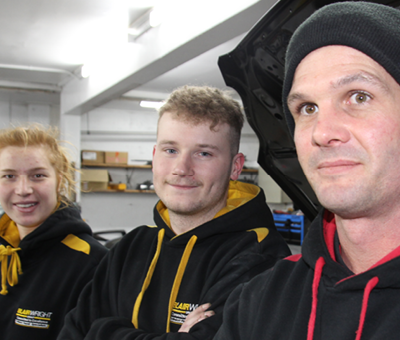December 2023
Education and Equipment are Key
Blair Wright Group workshop team leader Alex Hensley shares his knowledge on how to keep up with the ever-evolving panel repair sector. He’s been with the Blair Wright Group since starting his apprenticeship 17 years ago and looking for ways to work efficiently and increase business is a main focus for him.
It’s been constant change in technology since I did my apprenticeship. Now days we have a lot of crossover in skills between panel repair and paint and with new tech there is more and more we can do to attract new business.
EVs are opening up new opportunities for panel repair, more and more they are becoming part of the day-to-day repair work at our workshop.
To keep up with the latest technology on how to deal with them correctly the first thing I did was to look to what courses I could do to make sure we were prepared for this latest changes.
One I found really useful was the I-car EV course, it goes through all the various models and battery types, the types of battery cells we might come across, and how to deal with them.
Taking a course like this can also give you a good understanding of what you are dealing with and the confidence to do the job.
There have always been changes in cars with the increased use of computers, but those changes were not as big as switching to working on EVs.
Training to work on the EVs has also helped future-proof the business. Rather than having to turn away work because we are unsure how to deal with an EV we can attract business because we have the knowledge to get the job done.
Finding solutions
EVs have panel construction the same as most modern cars but to deal with them is a little bit more complicated if the car needs welding.
Things can turn really nasty if you don’t follow the right procedure.
To get around this a solution I am looking at is using pry bars and a glue tab pulling systems to remove dents without the need to weld.
This is also really helpful on EVs as often there are electronics behind a panel that you can’t see so this system is far less invasive.
It means there is no need for welding, no need for a mains battery disconnection and makes the whole process of working on an EV really time efficient.
An eye on tech
Keeping up with education on new developments is also a great way to future-proof the business and along with all the latest technology there are always smarter ways to do repairs.
Make sure your workshop gear is the best for the job.
At the moment, I am doing a list of current equipment in our workshop with the view of updating the tools so that we can efficiently tackle any job that comes in.
I am looking at equipment that will allow us to work on aluminium, we aren’t set up to deal with it at the moment and we have to outsource the job if one comes in.
What tends to happen is we replace the panels if they are not welded-on ones, but my thinking is there is a business opportunity missed to repair rather than replace.
It is the same for a lot of the plastic used on cars, I am looking at systems that will make repairing of plastic more efficient for us also.
We are also looking at ways to protect staff using the latest in dust masks, back when I started there wasn’t the same awareness of what we were working with.
Recycle everything
We recycle all the scrap metal from jobs along with the standard car battery and it is something I am keen on, but as far as plastic bumpers go something needs to change.
No-one wants them and it would be great if we had the same system as in Europe where the plastics are sent back to the manufacture for recycle or they are recycled into something useful.
Part of the new pathway in modern automotive repair has painters learning about modern panel repair methods and we as panel repairers are learning what they do, it makes us more efficient at what we do.
If we don’t do our jobs to 100 percent, then it can make a painter’s job all the more difficult and vice versa.
The more knowledge shared across trades the more the opportunity to make the business far more efficient, it means we know what both trades need to be done to complete the repair and we have better process in place to complete our part of the job.
I never realised how much change there would be in panel beating when I first came into the industry, but I think the constant learning is what keeps me at it.

